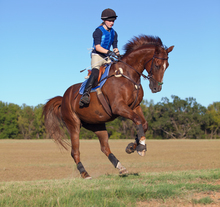Unsoundness and other frailties of old age often call for horses to be relieved of day-to-day performance requirements, but regular exercise remains important for older horses. Exercise comes in many formsâit can be as simple as encouraging aged horses to walk from one end of a field to the other for feed and water, or walk-only lessons or lazy strolls.

Importance of exercise for aging horses
Exercise boosts health of aged horses in important ways and encourages musculoskeletal health since a sedentary lifestyle weakens bones, muscles, tendons, and ligaments.
Exercise boosts health of aged horses in three important ways. First, it encourages a horseâs musculoskeletal health. A sedentary lifestyle weakens bones, muscles, tendons, and ligaments.
Aged horses that are stalled at night often seem especially creaky when turned out, and this is likely due to multiple hours of confinement with only occasional movement. Regular, low-impact movement will help keep joints healthy and reduce lameness.
Second, exercise helps keep the horseâs weight in check. Retirement and obesity frequently go hand in hand. An obese horse is not a healthy horse, and for older horses, excessive weight can be a precursor of endocrine problems, including metabolic syndrome.
Light, structured exercise can help ward off unnecessary weight and metabolic difficulties. Many horses that were familiar with daily contact will enjoy the interaction, especially if games or new skills are introduced.
Third, exercise can facilitate colic control. Aged horses have an increased risk of gastrointestinal issues, including colic. Specifically, old horses seem prone to impaction colic, likely associated with decreased motility of the gastrointestinal tract.
Horses with dental disrepair may also be predisposed to problems related to half-chewed feed and hay, such as choke or poor digestion of feedstuffs. Access to pasture and grazing will keep older horses moving to and fro, which will benefit their joints and their gastrointestinal tracts.
Properly maintaining an older horse requires a team of professionals. As always, a veterinarian who is familiar with the horseâs history should be consulted before starting any exercise regimen.
A nutritionist can formulate a diet that provides all of the required nutrients, including energy, to ensure optimal health without an overconsumption of calories. Nutritionists are familiar, too, of specialized requirements of some older horses.
Would you like help formulating a ration for your older horse? The nutrition advisors at Kentucky Equine Research (KER) are here to help. Get started now!
The experts at KER have created supplement collections to fulfill special nutritional requirements with research-backed KERx products. Throughout the month of October, get 15% off all products in the KERx Senior Horse Collection with code SENIOR16. Shop now.
Kentucky Equine Research (KER) is an international equine nutrition, research and consultation company serving both the horse producer and the feed industry. Its goal is to advance the industry's knowledge of equine nutrition and exercise physiology and apply this knowledge to produce healthier, more athletic horses. For more information, see www.ker.com or call 888-873-1988.
